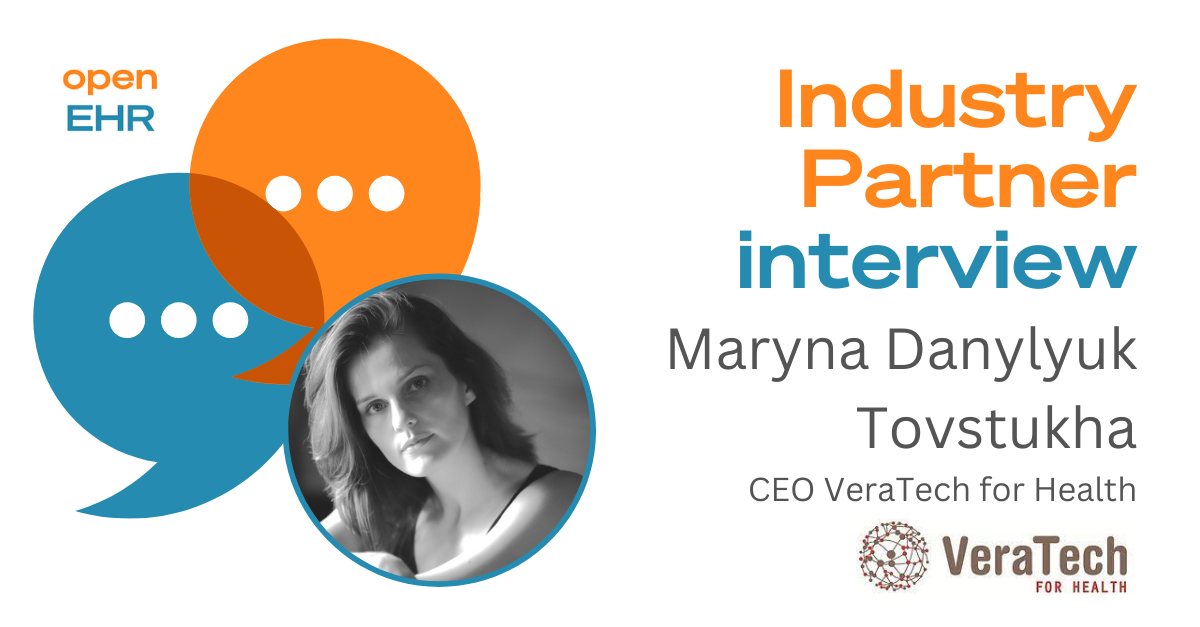I’m Maryna Danylyuk Tovstukha, the CEO of Veratech for Health – a bronze-level Industry Partner of openEHR, based in Valencia
My colleagues and I have been working in the area of healthcare records standards for more than 20 years. Diego Bosca and David Moner are the experts: Diego has been involved in the openEHR Specification Program for some time. David, who has a PhD in modelling, was invited to join openEHR’s Education Program because of his knowledge of the training processes in openEHR introduction, developing and modelling of electronic health records. David was further elected to the recently formed Education Program Board.
We’ve been working with openEHR for 13 years and as a pioneer contributing to openEHR as a standard..
Veratech has contributed a lot here in Spain by generating business, and promoting the benefits of openEHR over 13 years of training.
What is the focus of Veratech’s work?
We work in semantic interoperability. This is 100% our focus in addition to the consulting and training service in semantic interoperability and different standards of electronic health care records and terminology.
In addition we provide services such as modelling of electronic health records, integration of clinical data, normalisation of electronic health records and terminological normalisation.
Our R&D department has a lot of investment, both private and public, which is working on generating synergies between different electronic and terminological standards.
We are also an EHDEN data partner – one of the first in Spain. This is a European project that focuses on the normalisation of clinical data for investigation. They fund around 500 entities all over Europe, helping them normalise their data in the OMOP Common Data Model, so we have a good knowledge of OMOP, CDM and EHDEN.
We’re one of the SME partners that provide this kind of normalisation from a technical perspective. So I’d say we’re a reference SME company in the area of semantic interoperability, because we can consult in different areas, with different standards.
What openEHR projects are you working on at the moment?
Two major projects. The first is the CatSalut project – the Public Healthcare System In Catalunya – where we are working on the normalisation of electronic health records in openEHR. Last year, we provided the training process for the whole community in openEHR. This year we’re working with them on the modelling of electronic health records.
The second project I would like to highlight is our work with Infobanco. We’re working on generating a unified, standardised, normalised platform of data for investigation, and are working with different standards like HL7, FHIR (Fast Healthcare Interoperability Resource) and openEHR. It is the first project of its kind at this level and also the first project that brings together all the standards.
Do you work outside of Spain as well?
Yes, we work in Paraguay, Uruguay, Australia, Sweden…. we do a lot of European projects as part of the consortium. TARTAGLIA is one of the national projects here in Spain and we work with 16 partners here – it’s a four-year project: we’re generating an artificial intelligence platform of normalised data. But there is a lot of collaboration all over the world. There are no boundaries in this area.
Could you tell us a little bit more about the future of health data?
I still see the future incorporating the variety of standards we already have. I’m a realistic person and I also monitor tenders, calls, public calls and private contracts for integration and normalised platforms, and I don’t see any possibility to homogenise these solutions.
But the market here in Spain is a bit slow, so I still see a combination of different standards being used over the next few years. It’s very complicated: public healthcare has its own priorities, decision making can be a slow process compared to the speed of changing technologies, and this technology is still not the priority. There is funding – it’s not a question of the money, but rather time and human resources to dedicate to knowledge transfer and to changing standards. That’s why training is very important in this area and why there is a need to contribute to research.
But there is a lot of demand. The reason we need to provide normalised quality data is to give the opportunity for the research to provide artificial intelligence.
Where are you hoping to go next with openEHR?
There is a lot of interest in openEHR in Spain and we are already working on providing a deeper understanding of its use. We have a lot of new knowledge regarding the synergies between openEHR and other standards and are already providing that knowledge, the technology and methodology of how to combine different standards with OMOP, HL7 and so on.
Veratech would like to share knowledge at openEHR-organised events at the European or award level. We’re also looking into the possibility of collaborating on training, or just hiring additional experts to participate in the debate at the national level or at the level of different international communities that are interested in knowledge-sharing.
Health economists like myself are always asking how something benefits the population. This is really difficult to show but it is possible and great to combine the experience of countries that have already been using openEHR for a long time.
Find out more about openEHR Partners
If you are a member of openEHR and would like us to feature you, please email pr@openehr.org


Leave a Reply